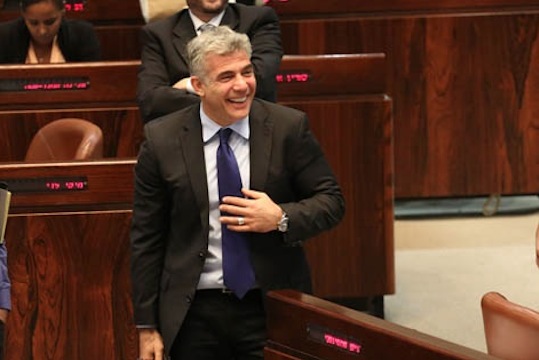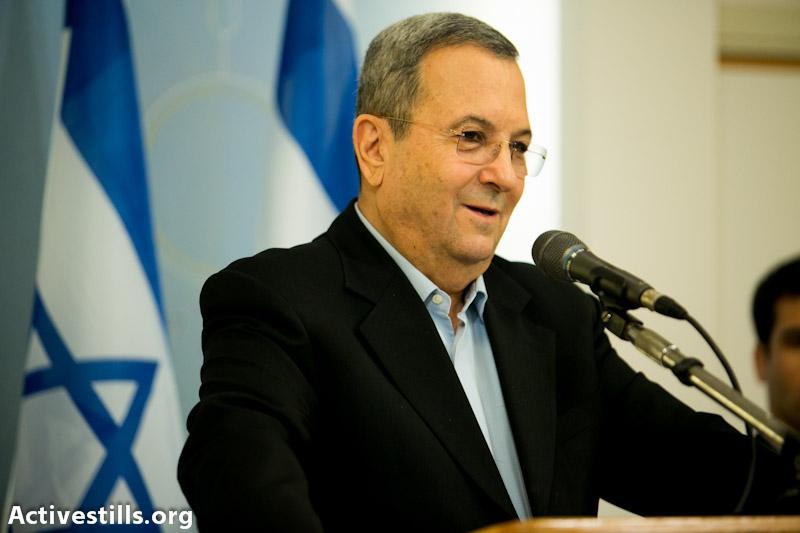Raviv Drucker, a prominent journalist who co-hosts a well-known television magazine program on Channel 10, wrote a tough blog post in which he takes some of Israel’s best known journalists to task for presenting a completely erroneous interpretation of the Palestinian position regarding a negotiated agreement for a two-state solution. I have translated his post with permission.
By Raviv Drucker
Ari Shavit has written another one of his fabulous treatises in his exemplary prose style that is, as his articles often are, completely detached from the facts. According to Shavit, Mahmoud Abbas is an intransigent negotiator who fails every time he is put to the test. The pièce de résistance of Shavit’s treatise comes at the point where he accuses Abbas of not having signed off on the Geneva Accord. Readers might recall that the Geneva Accord was a foreign affairs initiative between Yossi Beilin and Yasser Abed Rabo. But according to Shavit’s logic, the second most important person in the Palestinian Authority should have risked his own political credibility by signing off on concessions, in order to protect Yossi Beilin.
Yair Lapid gave a truly heartrending speech, in which he wondered aloud if Abbas had any desire to achieve statehood. Again and again, Lapid intoned, the president of the Palestinian Authority uses evasion tactics, refuses to sign agreements, avoids dealing with the end game. The peak of Lapid’s speech comes when he says:
Just about a year ago we agreed to join the governing coalition only after we received a commitment that we would return to the negotiating table on the basis of two states for two peoples.
It would be interesting to know who gave him that commitment. It’s not written anywhere in the guidelines of the government he joined. That commitment was intentionally (Naftali Bennett) excluded from the guidelines. Lapid did not insist upon it, which he probably does not even recall.
The veteran political analyst Nahum Barnea wrote in a column published on Friday [in the print edition of Yedioth Aharonoth] that the ink in Mahmoud Abbas’s pen has been dry since 1993 and the Palestinian leader won’t sign any further agreements.
You read these things and they can make you slowly lose your mind. People who are intelligent, knowledgeable, and experienced simply do not know their facts. Or perhaps they have an interest in distorting them?
Mahmoud Abbas has never been presented with an agreement which, in the view of people who know Palestinian society, he would have regarded as acceptable. Never. It could be true that he doesn’t have the political support necessary for the signing of a permanent agreement, but that claim has never been tested. On the other hand, the Israeli leader has been tested for five years and there is no doubt — he is not signing any agreement, ever.
Check out +972’s full coverage of the peace process
These are well-worn and tedious facts. But the Lapid-Shavit-Barnea-Livni spin machine is so irritating that we must go over them again.
For 26 years, Abbas has presented the same set of conditions for a permanent agreement. A Palestinian state established on the pre-1967 lines with its capital in East Jerusalem, and a mutually agreed upon resolution to the issue of the refugees. That is the price. He has not moved a fraction of an inch since 1988. Those are the conditions he presented in Oslo in 1993 and that’s what was on the table during a series of talks that took place when Ariel Sharon was foreign minister during Netanyahu’s first term as prime minister in the 1990s (is there anyone who even remembers those talks? There was a meeting-and-a-half or so). That was Abbas’s position at Camp David in 2000, at Taba in January 2011, and at Annapolis in 2007. The Palestinian position has consistently been that Israel would take 2-to-4 percent of the West Bank and compensate them for every yard of territory. In the eyes of the Palestinians, this is a huge concession compared to what was granted them under the partition agreement of 1947, and in light of their historical rights. You can agree or you can disagree, but that is their price and apparently there is no way to maneuver around it.
And yet generations of Israeli politicians who should have known better have tried to bargain over that price, as if they were in a Middle Eastern bazaar. The attitude of the Israeli negotiators seems to be, “The Palestinians say they want 100 percent of the territory that was conquered in 1967, but they’ll close the deal for less.” In 1999 Ehud Barak sketched a map that included 50 percent of the territory. Then [former deputy prime minister] Haim Ramon said he could close a deal with them for 80 percent. Peres said he could bring home an agreement for 90 percent, Barak suggested 92 percent at Camp David, Livni suggested the same number and Olmert went as high as 94 percent.
But Lapid, Shavit and Barnea keep coming back to the Camp David talks in July 2000, when Abbas supposedly got “cold feet.”
So here’s the thing. Abbas really did play a negative role at Camp David. There were all sorts of petty political considerations at play (the power games between Arafat and Abu Ala) that put him in a position of being passive and not very smart during those talks. At the same time, I have gathered from quite a few conversations over the years that the Israeli participants knew going into those talks that there was absolutely no chance of Abbas or Arafat signing the agreement that was presented to them. Barak made an amazing offer, particularly given Israeli public opinion. He agreed to divide Jerusalem, including the Old City, and he agreed to shared sovereignty over the Temple Mount/Haram al-Sharif.
But Barak knew going into those talks that no Palestinian leader could ever bring home an agreement that included only 91 percent of the territory of the West Bank (and an additional 1 percent in land swaps). Especially when a substantial portion of that territory (the Jordan Valley) would be leased back to Israel for decades in order to meet its security concerns. I am not absolving Arafat of responsibility for the failure of those negotiations. He sat passively at Camp David, and he never explained to his people the size of the risk and concessions that Barak was prepared to make. One can accuse Abbas of failing to clarify that point, but Abbas was not the leader at Camp David and anyway it’s absolutely clear today that no Palestinian leader could have signed that agreement — then or now.
Between 2000 and 2008 no agreement was ever presented to Abbas. During the Second Intifada, Abbas, with unprecedented courage, preached against violent resistance and acts of terrorism. It is largely due to his efforts that, since he took over as leader of the Palestinian Authority, Israelis have enjoyed some of the quietest years in the occupied territories. And there have been no suicide bombers. I am not brushing aside the shooting attacks [carried out by Palestinians] in the occupied territories, but look at the numbers. According to the Shin Bet, we haven’t had such a protracted period of quiet in the West Bank since before the First Intifada. But in Israel Abbas gets practically no credit for this achievement. Isn’t this our first and primary demand from the Palestinian Authority — an end to violence?
Even I am tired of writing about Livni and Olmert’s offer. But for those who don’t have the energy to go read my old articles, let me just repeat for the millionth time: Olmert made his super generous offer (and I am not being cynical) when he was already an outgoing prime minister with no political power or legitimacy. President Bush and Condoleeza Rice told him then that no agreement would result from his offer. Even a leftist like me would have objected to the signing of an agreement at that time, given the total lack of political support in Israel. The senior politicians would have rejected the agreement completely. Netanyahu, who at the time was head of the opposition and knew he had a serious chance of being elected prime minister, announced in real time that he would not honor the agreement if it were signed. Livni abstained from mentioning it at all. Bottom line: Even then, Abbas did not get cold feet, was not afraid and did not run away.
The Israelis have not made a single offer since 2008. Perhaps it is time for Lapid, Shavit and Barnea to take a look at the Israeli side of this story. For five years Netanyahu has been saying, “Just give me an opportunity to be alone in a room with him [Abbas] and I’ll surprise you. I want an agreement.” I’ve never doubted for a moment that Netanyahu had absolutely no surprises to offer and that all that talk was just more of his charlatan’s spin. After all, nothing was stopping him from sending an envoy to the Muqata’a in Ramallah to inform Abbas that he, Netanyahu, agreed to sign off on Olmert’s offer. Then we would have been able to see if Abbas really was a coward.
In the end, Abbas submitted to negotiations under the Kerry initiative. He knew he would be manipulated, he knew Netanyahu was not serious, but he thought — at least I’ll obtain the release of some of the political prisoners. For nine months there were negotiations, and guess what: Netanyahu didn’t even make a territorial offer. He wouldn’t offer a map. And he made security demands — that is, Defense Minister Moshe [Boogie] Ya’alon made demands — that were more draconian and more stringent than those made in the past by the very same security establishment. Then Barnea looks at all this and claims that Netanyahu was more generous than in previous rounds of negotiations.

You can claim that the Palestinian demands are excessive, that the State of Israel cannot pay this price, that it presents an untenable threat to its existence. Personally, I think it’s worth the risk because of a million other considerations. But that’s another matter. The thing that we know absolutely for certain is that when the leaders of the Israeli delegation, Tzipi Livni and Yitzhak Molho, entered the negotiating room, they knew exactly what the Palestinian price was. If they knew they had no intention of meeting that price, then these negotiations have been a fraud from the beginning. When you want to buy an apartment and the owner says the price is $1 million, you don’t offer him half a million. And you definitely don’t try to engage him in a long series of negotiations if he refuses to name his price at all.
The saddest thing is that Tzipi Livni, who until recently was a fairly decent politician, knew in 2011 how to call out Netanyahu for his response to negotiations with the Palestinians. But today she is, embarrassingly, trumpeting Netanyahu’s line.
Related:
Ari Shavit and the failure of the Kerry process
Israel suspends talks, and Washington’s hypocrisy on Hamas



